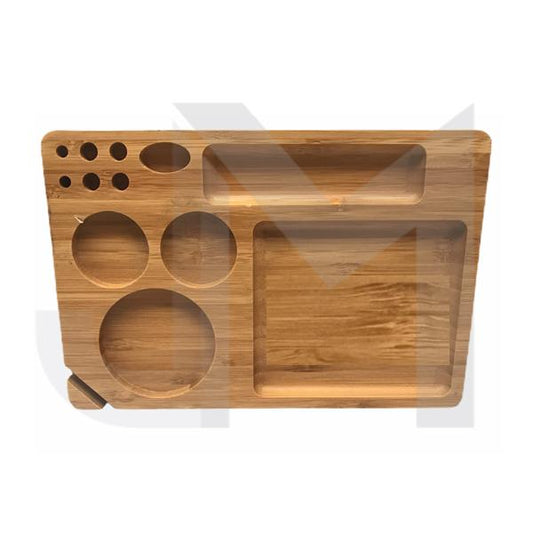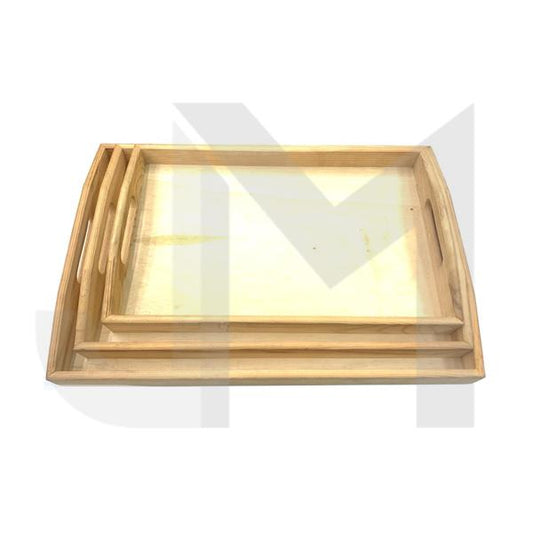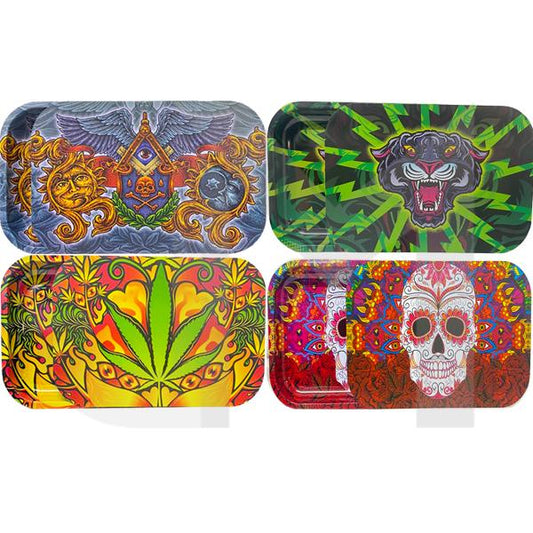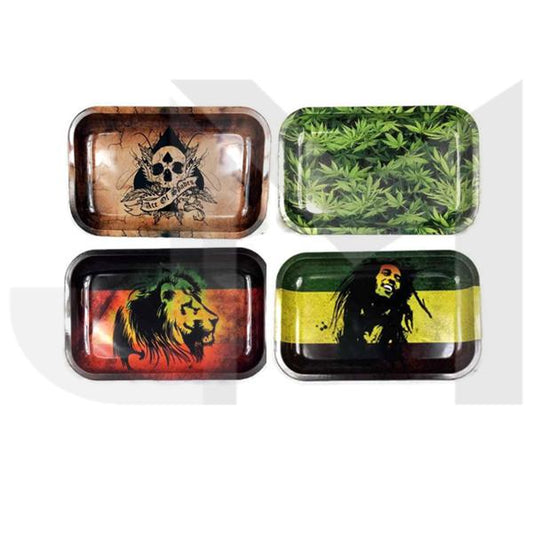-

Medium Wooden Rolling Tray with Compartments - TRY-B230x155
- Medium Sized Wooden Rolling Trays- With Rolling Compartment - Dimensions: 230 x 155mmMedium Wooden Rolling Tray with Compartments - TRY-B230x155
- Medium Sized Wooden Rolling Trays- With Rolling Compartment - Dimensions: 230 x 155mmLogin to view price -

Wooden Rolling Tray Set Pack of 3 - YD021
- Wooden Rolling Trays.- This Pack Contains 3 different Sizes Wooden Trays- Dimensions:(Small): 3...Wooden Rolling Tray Set Pack of 3 - YD021
- Wooden Rolling Trays.- This Pack Contains 3 different Sizes Wooden Trays- Dimensions:(Small): 3...Login to view price -

Large Mixed Design Magnetic Metal Rolling Trays with Lid
- Large Mixed Design Metal Rolling Trays - With Magnetic Lids- 30 x 18cm (Approx)- High-End Print...Large Mixed Design Magnetic Metal Rolling Trays with Lid
- Large Mixed Design Metal Rolling Trays - With Magnetic Lids- 30 x 18cm (Approx)- High-End Print...Login to view price -

Mixed Design Metal Rolling Tray - 3401
- Mixed Design Rolling Trays - A superbly made rolling tray at a great value price - High-end pri...Mixed Design Metal Rolling Tray - 3401
- Mixed Design Rolling Trays - A superbly made rolling tray at a great value price - High-end pri...Login to view price
Wholesale Rolling Trays & Mats Q & A
What materials are commonly used in wholesale rolling trays?
Wholesale rolling trays are typically made from a variety of materials to suit different preferences and budgets. The most common materials include metal, wood, and plastic. Metal trays, often made from aluminium or stainless steel, are durable and easy to clean. Wooden trays offer a more natural and aesthetically pleasing option, with bamboo and pine being popular choices. Plastic trays are lightweight and cost-effective, making them ideal for bulk purchases. Some high-end trays may also feature glass or ceramic components for a luxurious touch.
How do magnetic lids enhance the functionality of rolling trays?
Magnetic lids are a valuable feature in rolling trays, particularly in metal varieties. These lids serve multiple purposes, enhancing both functionality and convenience. Firstly, they provide a secure closure, preventing the contents from spilling or becoming contaminated when the tray is not in use. This is especially useful for transport or storage. Secondly, the magnetic lid can double as an additional surface for preparation or rolling. The strong magnetic connection ensures that the lid stays in place during use, offering stability and preventing accidents. Lastly, magnetic lids contribute to the overall sleek design of the tray, making it more visually appealing and easier to stack or store.
What sizes are available in wholesale rolling tray sets?
Wholesale rolling tray sets often come in various sizes to cater to different needs and preferences. A typical set might include small, medium, and large trays. For instance, a wooden rolling tray set might offer the following dimensions: small (32 x 20 cm), medium (35 x 23 cm), and large (38 x 26 cm). This variety allows retailers to stock options suitable for personal use, travel, or larger gatherings. The range of sizes also provides customers with choices based on their space constraints and rolling habits.
How do rolling mats differ from rolling trays in functionality?
Rolling mats and rolling trays serve similar purposes but differ in their design and functionality. Rolling mats are typically made of flexible materials like silicone or fabric, offering a portable and easily storable option. They provide a clean, flat surface for rolling and can be rolled up or folded when not in use, making them ideal for on-the-go use. Rolling trays, on the other hand, are rigid and often feature raised edges to prevent spillage. They provide a more stable surface and can include compartments for organising materials. Trays are better suited for home use or as a permanent rolling station, while mats offer greater portability and discretion.
What are the benefits of using a rolling tray with compartments?
Rolling trays with compartments offer several advantages for users. Firstly, they help in organising various materials needed for rolling, keeping everything in one place and easily accessible. This organisation can include separate sections for papers, filters, herbs, and other accessories. Secondly, compartments prevent mixing of different materials, ensuring cleanliness and preserving the quality of each component. The design also minimises spillage and waste, as each item has its designated space. Additionally, compartmentalised trays often feature a larger rolling area, providing ample space for preparation while keeping other materials neatly stored.
How do wholesale rolling trays contribute to branding opportunities for retailers?
Wholesale rolling trays present excellent branding opportunities for retailers. Many suppliers offer customisation options, allowing retailers to add their logo, brand name, or unique designs to the trays. This personalisation turns a functional item into a marketing tool, increasing brand visibility every time the tray is used. Custom-branded trays can also serve as promotional items or limited edition products, attracting collectors and brand enthusiasts. Furthermore, unique designs or branded trays can set a retailer apart from competitors, fostering brand loyalty and recognition in a crowded market.
What features should retailers look for in high-quality wholesale rolling trays?
When selecting high-quality wholesale rolling trays, retailers should consider several key features. Durability is paramount; trays should be made from sturdy materials that can withstand frequent use and cleaning. The surface should be smooth and easy to clean, preferably with a non-stick quality to prevent residue buildup. Raised edges are essential to prevent spillage and contain materials. For metal trays, rust-resistance is crucial for longevity. Aesthetic appeal is also important, as attractive designs can increase sales. Additional features like magnetic lids, compartments, or unique shapes can add value. Lastly, consider the weight and portability, as some customers may prefer lighter options for travel.
How do eco-friendly rolling trays differ from standard options?
Eco-friendly rolling trays are becoming increasingly popular as consumers grow more environmentally conscious. These trays are typically made from sustainable materials such as bamboo, recycled metal, or biodegradable plastics. Unlike standard options, eco-friendly trays prioritise minimal environmental impact in their production and disposal. They often feature natural finishes or water-based paints to reduce chemical use. While they may be slightly more expensive, eco-friendly trays appeal to environmentally conscious consumers and can help retailers align with sustainable practices. These trays often have a unique aesthetic, combining functionality with a natural, earthy appearance.
What are the advantages of offering a diverse range of rolling tray designs?
Offering a diverse range of rolling tray designs provides several advantages for wholesalers and retailers. Firstly, it caters to a wider customer base with varying tastes and preferences. Some customers might prefer minimalist, sleek designs, while others might opt for vibrant, artistic patterns. A diverse range also allows for seasonal or themed collections, which can drive sales during specific periods or events. Different designs can target various demographics, from young adults to more mature users. Additionally, a wide selection encourages repeat purchases, as customers may want to collect different designs. This variety can also lead to increased average transaction values, as customers might be tempted to purchase multiple trays for different occasions or settings.
How can retailers effectively display and market wholesale rolling trays and mats?
Effective display and marketing of wholesale rolling trays and mats can significantly boost sales. Retailers should create dedicated sections in their stores, grouping trays and mats by size, material, or design theme. Using tiered displays can showcase a variety of options while maximising space. Highlighting unique features, such as compartments or eco-friendly materials, through informative signage can educate customers and justify pricing. Retailers can also create bundle deals, pairing trays with complementary products like papers or grinders. Online, high-quality images showcasing the trays from multiple angles and in use can enhance appeal. Featuring customer reviews and ratings can build trust and encourage purchases. Lastly, social media marketing, showcasing the trays in lifestyle settings or demonstrating their use, can attract a wider audience and drive both online and in-store sales.



















